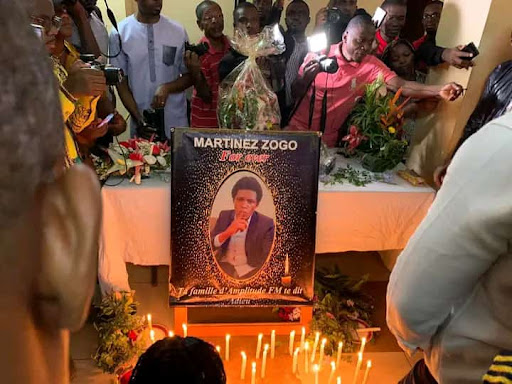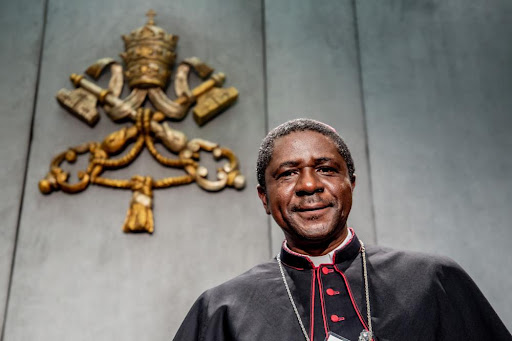Death Of Journalist In Cameroon ‘Extrajudicial Killing’, Says Archbishop
The Archbishop of Bamenda has said the death of journalist, Martinez Zogo, tops the list of a wave of recent “extrajudicial killings". Members of the security services are implicated in the murder that rocked Cameroon in January.

A leading Catholic cleric in Cameroon has called the slaying of a prominent radio journalist an “extrajudicial killing”.
Martinez Zogo was abducted in January and his tortured body discovered in Yaoundé a few days later.
“In recent months, we have been very saddened by the various extrajudicial killings that have taken place in our society. Top among which is the murder of journalist, Martinez Zogo, in Yaoundé,” said Archbishop of Bamenda, Andrew Nkea Fuanya.
The Archbishop called for the “real killers” to be identified and prosecuted at a conference of the Cameroonian Catholic leadership.
A killing is “extrajudicial” when an official kills, or causes by their order someone to be killed, without the proper recourse to the law. This is distinct from plain criminal murder, human rights organisations say.
Zogo, an outspoken radio personality, used his radio show to criticise corrupt government officials and businessmen.
Archbishop Nkea Fuanya used his speech opening the National Episcopal Conference on April 18 to denounce the killing, saying; “to kill someone is a sin against the 5th Commandment of the Decalogue and this commandment clearly states: ‘Thou shall not kill.’”
“It is our prayer and hope that the real killers of fellow citizens will be clearly identified and brought to book according to the laws of our country,” he said.
A number of arrests have been made in the investigation into who killed 51-year-old Zogo, director of Amplitude FM.
Several members of the General Directorate of External Investigations, part of the Cameroonian security services, have been arrested in connection with the killing, as well as the owner of a media company.
Those arrested have been “provisionally charged”, a step in Cameroon’s legal code toward a magistrate’s decision to either release, or move forward to trial.
‘Treason’
Other killings in the country could also be said to be “extrajudicial”. There have been at least 52 deaths in disturbing circumstances since January, it has been reported.
Anglophone separatists are also implicated. There have been a number of execution-style murders of people the terrorists have branded ‘traitors’.
A man known in Bamenda for assisting people to prepare documents to help them get a national identity card was abducted by separatist terrorists.
In a video circulated on social media on April 15, terrorists can be heard accusing him of ‘treason’.
“How dare you do this in our land?” a man says in the video posted to Facebook.
“What you have done is called treason and the penalty for treason is death.”
The man in the video, who has only been publicly named as “Ali”, was later found dead, his body dumped in the Nitop neighbourhood in Bamenda.
In another case, in February, HumAngle reported a young mother was brutally killed, accused of informing on her separatist boyfriend.
Retaliation
In another recent case of extra-judicial killing, the family of a 32-year-old motorcycle taxi driver in Bamenda, Northwest Cameroon, are yet to recover from his murder a week ago.
Ajer Afanwi was killed as he rode his motorbike near the scene of a previous attack by terrorists on the military. He was shot three times in the chest.

His brother. Anthony Afanwi, said “we are still in shock. Ajer was a calm boy, kind and welcoming. My brother is not a separatist fighter, but they [the military] killed him”.
Witnesses say the military opened fire on people in retaliation for a separatist attack in which a soldier was killed.
Ajer had nothing to do with the attack, his brother said.
There have been many other cases when the retaliation by the military has led to the death of civilian bystanders.
Ongoing crisis
More than 6,000 people have been killed as a result of an ongoing crisis in the English-speaking regions, where separatist fighters want to force a separate country.
“We are launching a very strong appeal to all Cameroonians to stop killing each other. We are all brothers and sisters of the same homeland and children of the same God,”said Archbishop Nkea Fuanya, president of the Episcopal Conference.
“The Bishops of Cameroon together with the Universal Catholic Church have always called on all people to respect human life, which is a gift from God,” said the Archbishop.
He began his speech by saying that the overall situation in the Anglophone region had improved.
“Thanks be to God, relative calm is returning to the North West and South West regions,” he said. “Some businesses are reopening and many children are going back to school.” But insecurity remains concerning.
This is not the first time the 58-year-old Archbishop has taken an outspoken position. In Sept. 2022, HumAngle reported how he refused to pay a ransom for a number of people kidnapped from his diocese, saying it would create a “dangerous precedent”.
The group of nine people, including five priests and a nun, were released a month later, although it is not known if a ransom was eventually paid to separatists.
Support Our Journalism
There are millions of ordinary people affected by conflict in Africa whose stories are missing in the mainstream media. HumAngle is determined to tell those challenging and under-reported stories, hoping that the people impacted by these conflicts will find the safety and security they deserve.
To ensure that we continue to provide public service coverage, we have a small favour to ask you. We want you to be part of our journalistic endeavour by contributing a token to us.
Your donation will further promote a robust, free, and independent media.
Donate HereStay Closer To The Stories That Matter




